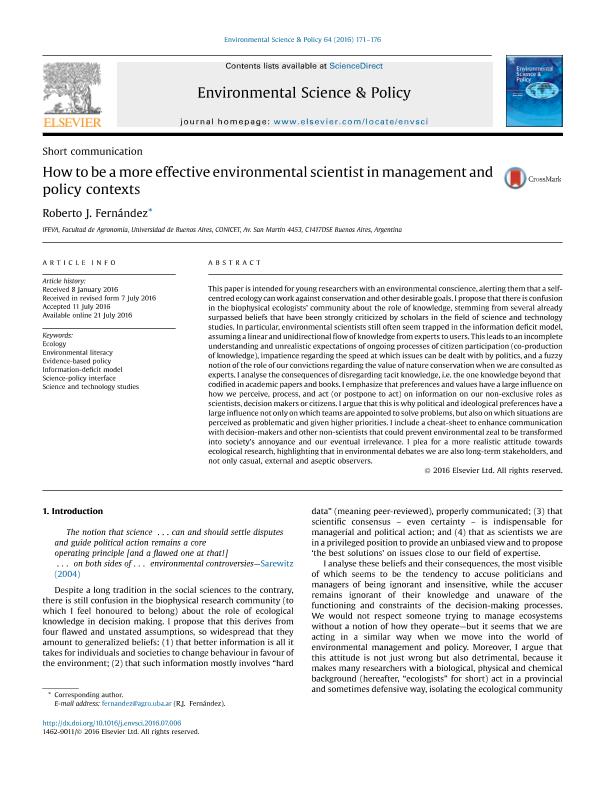Mostrar el registro sencillo del ítem
dc.contributor.author
Fernandez Alduncin, Roberto Javier

dc.date.available
2018-07-06T21:01:53Z
dc.date.issued
2016-10
dc.identifier.citation
Fernandez Alduncin, Roberto Javier; How to be a more effective environmental scientist in management and policy contexts; Elsevier; Environmental Science & Policy; 64; 10-2016; 171-176
dc.identifier.issn
1462-9011
dc.identifier.uri
http://hdl.handle.net/11336/51556
dc.description.abstract
This paper is intended for young researchers with an environmental conscience, alerting them that a self-centred ecology can work against conservation and other desirable goals. I propose that there is confusion in the biophysical ecologists’ community about the role of knowledge, stemming from several already surpassed beliefs that have been strongly criticized by scholars in the field of science and technology studies. In particular, environmental scientists still often seem trapped in the information deficit model, assuming a linear and unidirectional flow of knowledge from experts to users. This leads to an incomplete understanding and unrealistic expectations of ongoing processes of citizen participation (co-production of knowledge), impatience regarding the speed at which issues can be dealt with by politics, and a fuzzy notion of the role of our convictions regarding the value of nature conservation when we are consulted as experts. I analyse the consequences of disregarding tacit knowledge, i.e. the one knowledge beyond that codified in academic papers and books. I emphasize that preferences and values have a large influence on how we perceive, process, and act (or postpone to act) on information on our non-exclusive roles as scientists, decision makers or citizens. I argue that this is why political and ideological preferences have a large influence not only on which teams are appointed to solve problems, but also on which situations are perceived as problematic and given higher priorities. I include a cheat-sheet to enhance communication with decision-makers and other non-scientists that could prevent environmental zeal to be transformed into society's annoyance and our eventual irrelevance. I plea for a more realistic attitude towards ecological research, highlighting that in environmental debates we are also long-term stakeholders, and not only casual, external and aseptic observers.
dc.format
application/pdf
dc.language.iso
eng
dc.publisher
Elsevier

dc.rights
info:eu-repo/semantics/openAccess
dc.rights.uri
https://creativecommons.org/licenses/by-nc-sa/2.5/ar/
dc.subject
Ecology
dc.subject
Environmental Literacy
dc.subject
Evidence-Based Policy
dc.subject
Information-Deficit Model
dc.subject
Science And Technology Studies
dc.subject
Science-Policy Interface
dc.subject.classification
Otras Ciencias Biológicas

dc.subject.classification
Ciencias Biológicas

dc.subject.classification
CIENCIAS NATURALES Y EXACTAS

dc.title
How to be a more effective environmental scientist in management and policy contexts
dc.type
info:eu-repo/semantics/article
dc.type
info:ar-repo/semantics/artículo
dc.type
info:eu-repo/semantics/publishedVersion
dc.date.updated
2018-06-22T14:34:39Z
dc.journal.volume
64
dc.journal.pagination
171-176
dc.journal.pais
Países Bajos

dc.journal.ciudad
Amsterdam
dc.description.fil
Fil: Fernandez Alduncin, Roberto Javier. Consejo Nacional de Investigaciones Científicas y Técnicas. Oficina de Coordinación Administrativa Parque Centenario. Instituto de Investigaciones Fisiológicas y Ecológicas Vinculadas a la Agricultura. Universidad de Buenos Aires. Facultad de Agronomía; Argentina
dc.journal.title
Environmental Science & Policy

dc.relation.alternativeid
info:eu-repo/semantics/altIdentifier/doi/http://dx.doi.org/10.1016/j.envsci.2016.07.006
dc.relation.alternativeid
info:eu-repo/semantics/altIdentifier/url/https://bit.ly/2ziKFW8
Archivos asociados
